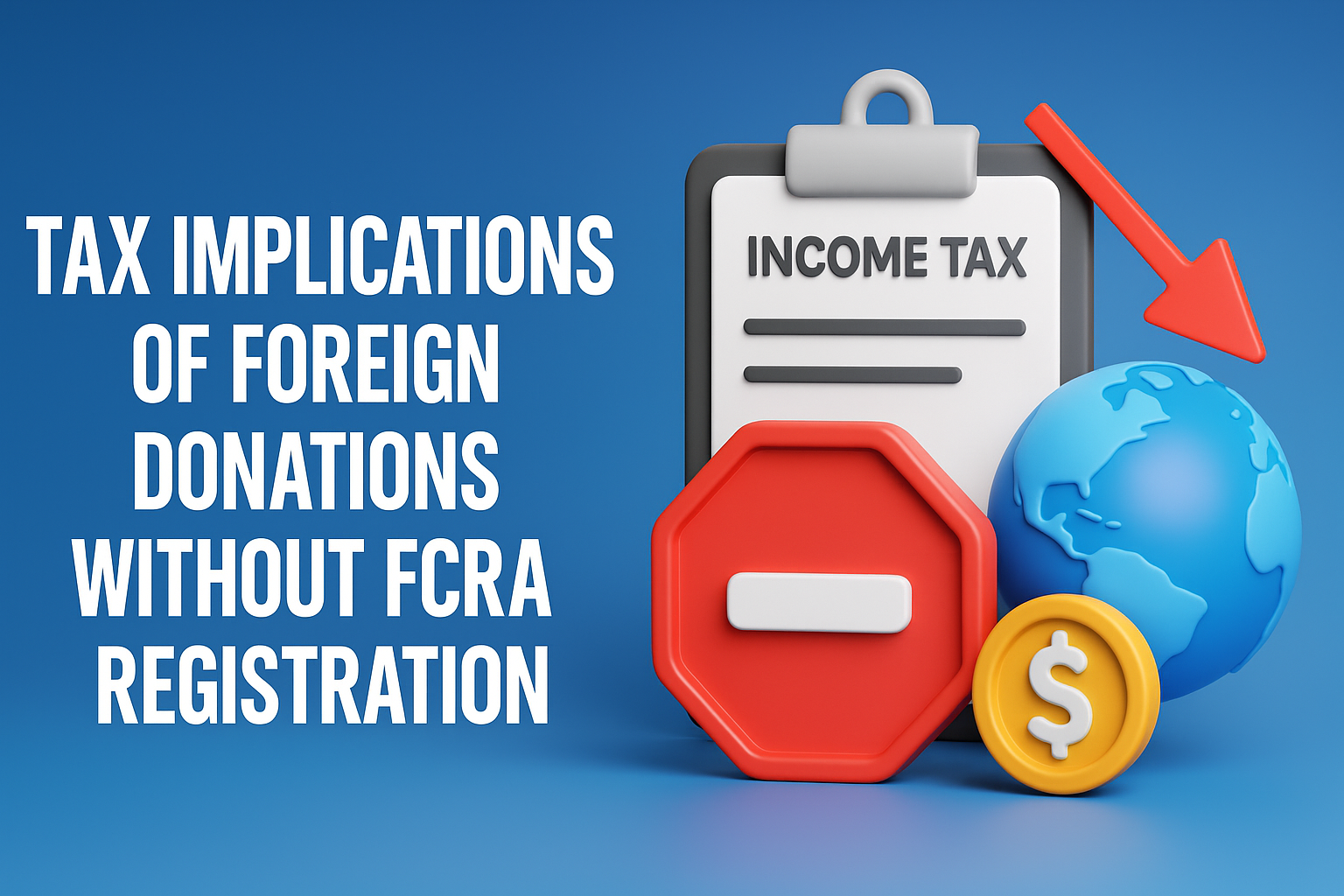
Tax Implications of Foreign Donations Without FCRA Registration
Overview of FCRA Requirements
The Foreign Contribution (Regulation) Act, 2010 (FCRA), stands as a cornerstone of regulatory oversight, meticulously governing the inflow and utilization of foreign contributions by NGOs in India. Its primary objective is to ensure that foreign funds are used for legitimate charitable purposes, aligning with national security and public interest. NGOs seeking to receive foreign donations must either obtain FCRA registration or secure prior permission for specific contributions. Registration is typically reserved for organizations with a proven track record, requiring at least three years of operation and significant expenditure on charitable objectives. Prior permission, conversely, caters to newer NGOs or specific projects. Accepting foreign donations without FCRA complianc is a grave violation, triggering severe penalties and potential tax liabilities under the Income Tax Act, 1961.
Statutory Framework
Section 11 of the FCRA, 2010, explicitly prohibits NGOs from accepting foreign contributions without registration or prior permission. Violations can lead to penalties under Section 35, including imprisonment for up to five years and substantial fines. The Income Tax Act, 1961, further complicates the scenario, as Section 11 grants exemptions for income applied to charitable purposes, but non-compliance with FCRA may render such donations taxable under Section 2(24) as voluntary contributions. This dual regulatory framework underscores the critical need for NGOs to adhere to FCRA protocols to maintain their tax-exempt status and avoid legal repercussions.
Penalties for Non-Compliance
Non-compliance with FCRA requirements for foreign donations invites a cascade of penalties, reflecting the stringent enforcement by the Ministry of Home Affairs (MHA). These include financial fines, seizure and confiscation of funds under Section 25, and potential imprisonment for deliberate violations. Persistent non-compliance may lead to the cancellation of FCRA registration, barring NGOs from receiving future foreign contributions. Under the Income Tax Act, unauthorized foreign donations may be classified as taxable income, stripping NGOs of exemptions under Section 12A/12AB. This dual jeopardy amplifies the financial and operational risks, making compliance non-negotiable
Judicial and Regulatory Insights
Judicial and regulatory actions underscore the gravity of FCRA compliance. In 2022, the Income Tax Department conducted surveys on the Centre for Policy Research (CPR) for alleged FCRA violations, highlighting the interplay between FCRA and tax scrutiny (Income Tax Raids). The Supreme Courts 2022 ruling upholding FCRA amendments further emphasized the need for transparency in foreign funding, reinforcing strict compliance requirements (FCRA Supreme Court Ruling). These precedents illustrate the MHAs and judiciarys commitment to enforcing FCRA regulations
Practical Scenarios
To elucidate the implications, consider an NGO that receives a Rs. 5 lakh donation from a foreign donor without FCRA registration. The MHA seizes the funds, imposes a fine, and the donation is treated as taxable income under the Income Tax Act, as it fails to qualify for Section 11 exemption. In another scenario, an FCRA-registered NGO receives foreign donations in a non-designated bank account, leading to confiscation and tax scrutiny with the funds taxed as income. Conversely, an NGO with prior permission for a Rs. 3 lakh foreign grant for a medical camp ensures compliance by using the designated SBI account, securing tax exemption and avoiding penalties.
Common Pitfalls and Mitigation Strategies
NGOs often stumble in their FCRA compliance efforts, leading to costly consequences. A frequent error is assuming small foreign donations are exempt from FCRA requirements, resulting in fund seizure and legal penalties. To mitigate this, NGOs must register under FCRA or obtain prior permission before accepting any foreign contributions. Another common mistake is depositing foreign donations in a regular bank account, violating the requirement for a designated FCRA account with SBI, New Delhi. NGOs can avoid thi by opening and exclusively using the designated account. Inadequate reporting, such as failing to file FCRA returns, also invites penalties. NGOs should file annual returns using Form FC-4, even for nil contributions, to ensure compliance.
Professional Recommendations
To navigate the complexities of FCRA compliance, NGOs should apply for FCRA registration via Form FC-3A or seek prior permission for specific contributions if ineligible for registration. Opening a dedicated FCRA account with SBI, New Delhi, is imperative for all foreign contributions. Maintaining meticulous records of donor details, contribution amounts, and utilization reports is crucial to withstand MHA scrutiny. Engaging tax professionals to assess potential tax liabilities in case of non-compliance is advisable. Regular audits should be conducted to verify compliance with both FCRA and Income Tax Act requirements, ensuring robust financial governance.
Conclusion
Receiving foreign donations without FCRA registration is a perilous endeavor, inviting severe penalties under the FCRA and potential tax liabilities under the Income Tax Act. NGOs must prioritize FCRA compliance by securing registration or prior permission using designated bank accounts, and maintaining comprehensive records. By adhering to these protocols and seeking professional guidance, NGOs can safeguard their operations and maintain their tax-exempt status, ensuring their charitable missions flourish without interruption.
Foreign Hospitality vs Foreign Contribution Clarifying Confusion Overview The distinc...
Whether GST Should Apply to Donations Linked to Services– Controversy Around NGO Train...
Electoral Trusts and Electoral Bonds: An In-Depth Overview 1. Introduction Political funding...
Income from Business by NGOs: Section 11(4A) Explained Legal Framework (Sections 11(4) and 11(4A...
Detailed Procedure for FCRA Registration and Renewal (Form FC-3A & FC-3C) Introdu...
Private trusts serve as powerful tools for asset management and wealth preservation, but understan...
Can Religious Trusts Register Under FCRA? Religious trusts, which focus on activities r...
Tax Basics: The tax rules for private trusts are laid out in Sections 160 to 164 of the Incom...
Private trusts and family trusts are like magical shields that protect your money and property. Th...
How to File ITR-7: A Step-by-Step Guide Who Must File. ITR-7 is the Income-tax return f...